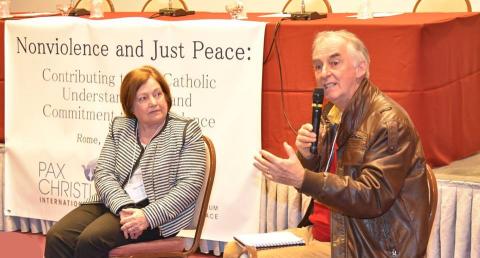
Gerry Lee, the director of the Maryknoll Office for Global Concern, is in Rome for the conference "Nonviolence and Just Peace: Contributing to the Catholic Understanding of and Commitment to Nonviolence," April 11-13. Below is his report on the first full day of the conference. Click here to find all of our articles and photos from the conference.
April 12, 2016 – The first full day of the "Nonviolence and Just Peace: Contributing to the Catholic Understanding of and Commitment to Nonviolence" conference began with a Mass in a beautiful old chapel “Domus Pacem” on campus.
The process
The process we are using is a participatory one, where all of the 80+ delegates are invited to share their experiences of the spirituality and practice of Catholic nonviolence. We are using a modified ‘fishbowl’ technique where there are six chairs in the middle of several concentric circles of more and more chairs. Four presenters offer 5 minute reflections on their practice of the topic, and then they briefly dialogue with each other. Next, participants from the outer circles are invited to take one of the two empty chairs in the middle of the circles and share from their experience. Once they have spoken they leave the inner circle and others come up to sit and offer their brief comments. Following this primary dialogue we then break into small groups of ten to reflect more deeply on the topic, a reflection that is then brought back to a plenary.
As you can imagine, with 80 laity, religious, bishops and priests from more than 35 countries, there is a rich diversity of experience in the practice of nonviolence. Today we heard incredibly moving testimonies of hope and struggle from a sister in Iraq, a bishop in South Sudan, a priest from Jeju Island, a laywoman who is a leader of Kairos Palestine, to name a few. Ken Butigan, one of our facilitators, remarked that to call this a nonviolent “conference” is a misnomer – it is a dialogue, a process, or more accurately, the beginning of a process that we hope will sweep through the entire Church.
The first session
The first session today was “Experiences of Nonviolence: Inductive exploration of the experience of nonviolence as a spiritual commitment of faith and a practical strategy in violent situations and different cultural contexts." What might we learn from such experience to provide soil for theological reflection and action planning?” The lead reflectors were Katrina Kruhonja of Croatia, Bishop Paride Taban of South Sudan, Mairead Maguire of Ireland and Pietro Ameglio of Mexico. After powerful testimonies by these four, Maria Stephan of the U.S. stepped into the inner circle and shared her research on the success of nonviolent struggles compared to violent tactics in ending oppressive regimes.
The second session
The second session was “Jesus’ way of nonviolence: How do recent experiences of nonviolence help illuminate our understanding of Jesus’ way of nonviolence and engaging conflict?" What has the latest scholarship and praxis revealed about Jesus’ approach and practices for nonviolence and engaging conflict? How might we integrate recent theological reflection on nonviolence? How can we appropriate these insights into present day contexts? The lead reflectors were Benedictine Sister Anne McCarthy, Fr. Jamal Khader of Palestine, and Fr. John Dear. Their challenging reflections were followed by lively interventions by Bishop Luigi Bettazzi of Italy (who attended Vatican Council II and is a former president of Pax Christi, Maryknoll Sisters Teresa Hougnon and Joanne Doi, Rose Berger of Sojourners, former Maryknoll Lay Missioner Merwyn DeMello of Afghanistan and Chris Cole of Pax Christi UK - a leading drones activist.
Our hopes
It’s hard to summarize such a rich day in few words. We were encouraged to be bold and call upon the hierarchy to affirm Jesus’ nonviolence and to seek an encyclical on peace. We recognized that all too often the church is complicit with the military-industrial complex and itself becomes a contradiction to the Gospel. At the same time we celebrated the many inspirational church women and men who by their practice of nonviolence in situations of extreme violence are themselves offering tremendous leadership in our church. Their practice is often with powerful liturgical expressions in conflict zones that speak to the spirituality of nonviolence and at the same time challenge both political and ecclesiastical leaders to stop their unquestioning support of militarism and violence.
Our valiant writing committee is now beginning to pull together the threads of this rich dialogue and we hope to have a consensus document with an action plan by the end of the conference tomorrow. Keep us in your prayers! (Click here for a prayer written for the conference.)
